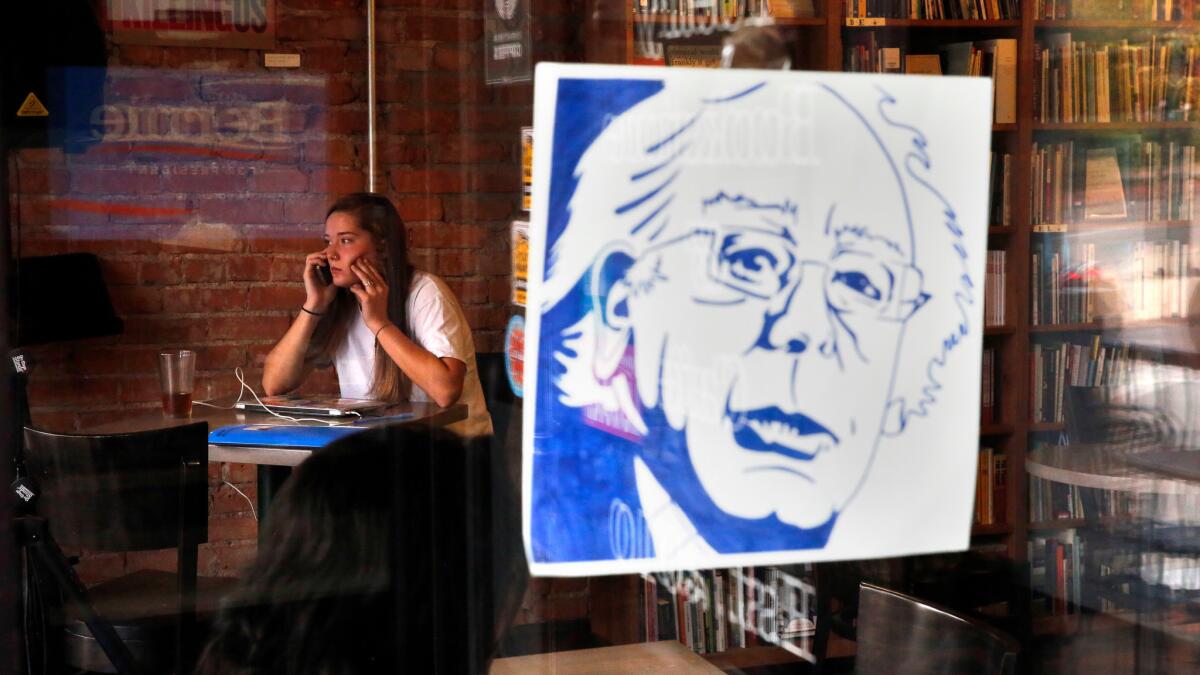Op-Ed: Bernie Sanders’ pollster explains how Clinton can gain ground with millennial voters

With the presidential race still too tight for comfort, polls point to one demographic where Hillary Clinton could gain ground: millennial voters. In the final weeks, can she win over these 18- to 35-year-olds and keep them from throwing their support to third-party candidates?
As the pollster for Bernie Sanders’s presidential campaign, I learned a lot about what issues engage this generation. Sanders didn’t start off with overwhelming support from millennials, after all. His campaign had to develop a strategy to earn their vote, and Clinton could still do the same.
We learned from an extensive amount of survey research and focus groups that millennials are fundamentally progressive. How progressive? Among Democratic and independent millennials in some states, support for gay marriage is as high as 92%. Still, they feel they’ve been dealt a bad hand of economic recession, wage stagnation and political gridlock. They want income inequality, racial justice and climate change addressed urgently.
Mediocre job prospects and high levels of college debt led to [millennials’] overwhelming support for Sanders’ plan for free college tuition.
Their mediocre job prospects and high levels of college debt led to overwhelming support for Sanders’ plan for free college tuition; up to 90% of Democratic and independent millennials in key states back the idea. But it wasn’t just economic issues that resonated with this generation. We also had to address social justice and criminal justice reform.
In Michigan, for example, our first poll found Sanders leading Clinton among millennials by just 19 points. But once they heard his position on criminal justice reform, Flint’s tainted water, and his plan to provide free college tuition, he took a commanding 45-point lead in the survey. Notably, he gained ground with both white and African American millennials.
We then did focus groups among young swing voters in Detroit. We showed them a series of ads to see which moved them. An ad focused on Flint’s water crisis stood out, as did one featuring Erica Garner, whose father was killed by police on TV. The latter brought many to tears and swayed several of these previously undecided voters. As one African American young man commented, “Now that is talking about the real issues facing our community.”
This research laid the foundation for the Michigan Miracle, Sanders’ surprising upset in the primary. He won 81% of millennials in that primary.
While Clinton is currently underperforming with millennials, she shares their values more than any other candidate. In a recent New York Times/CBS poll, however, 26% said they’d vote for Gary Johnson, the Libertarian candidate, and 10% said they’d vote for Green Party nominee Jill Stein. This is a huge pool of potential voters who abhor Trump and everything he stands for but are not yet backing Clinton.
To turn them into Clinton supporters, her campaign will need to make a focused effort to show them that she authentically shares their values and is committed to addressing the issues they see as urgent. The college affordability plan she announced over the summer with Sanders was a good start, but it needs to be reiterated again and again in swing state after swing state. One thing no one disputes about Sanders and why he was so effective: He stayed on message.
Clinton cannot simply roll out a policy speech on a college campus and move on. Instead, her team must drive it home with college students and other millennials everywhere day after day, and it must be echoed by a savvy social media campaign.
Another opportunity for Clinton is to take a stronger stand in support of the Black Lives Matter movement in response to the recent shootings of unarmed black men by police. We found this was one of the most potent issues with millennials, regardless of ethnicity, in nearly all of the 46 states in which we polled.
If Clinton were to stand firmly with African Americans and fully acknowledge their grievances with the criminal justice system, that would likely surprise millennials. Taking such a bold stand on a controversial issue would help Clinton connect with them on a cause about which they care deeply. While her advisors may recommend a more risk-averse approach, I would argue that this move makes political sense. Her upside with this large progressive generation could be significant, whereas even moderate Republicans are solidifying against her, leaving her little room to grow with them.
While Clinton appears to have gotten a bump after the first presidential debate, her lead is still too thin considering she’s running against the most unpopular candidate in modern presidential history. She has a legitimate opportunity to make headway with this sizable and progressive generation. If the Clinton campaign gets the strategy, tone and focus just right, millennials can make the difference in this election and put the country’s first female president in the White House.
Ben Tulchin, President of Tulchin Research, served as the pollster for Bernie Sanders’ campaign.
Follow the Opinion section on Twitter @latimesopinion and Facebook
More to Read
A cure for the common opinion
Get thought-provoking perspectives with our weekly newsletter.
You may occasionally receive promotional content from the Los Angeles Times.






